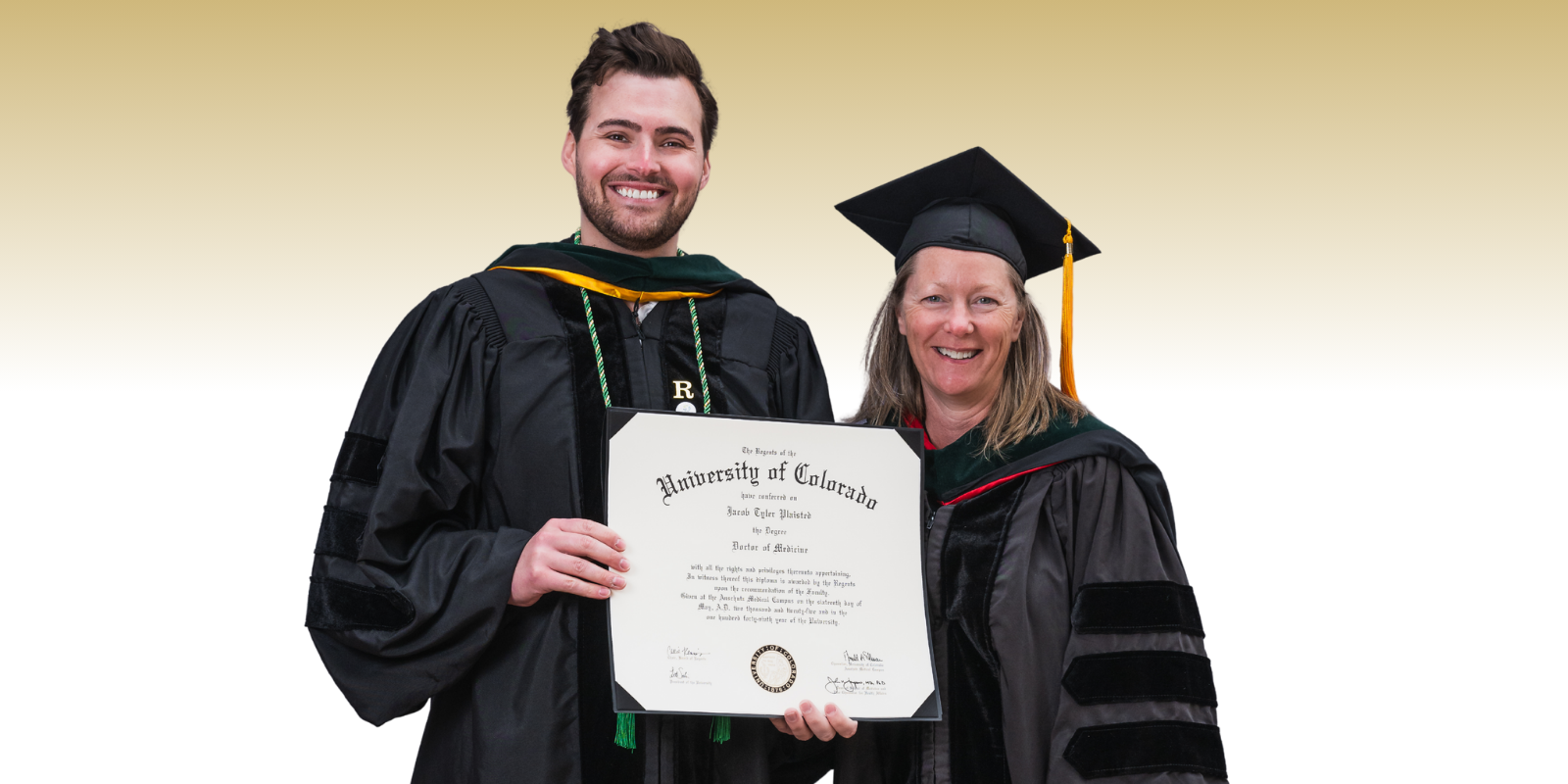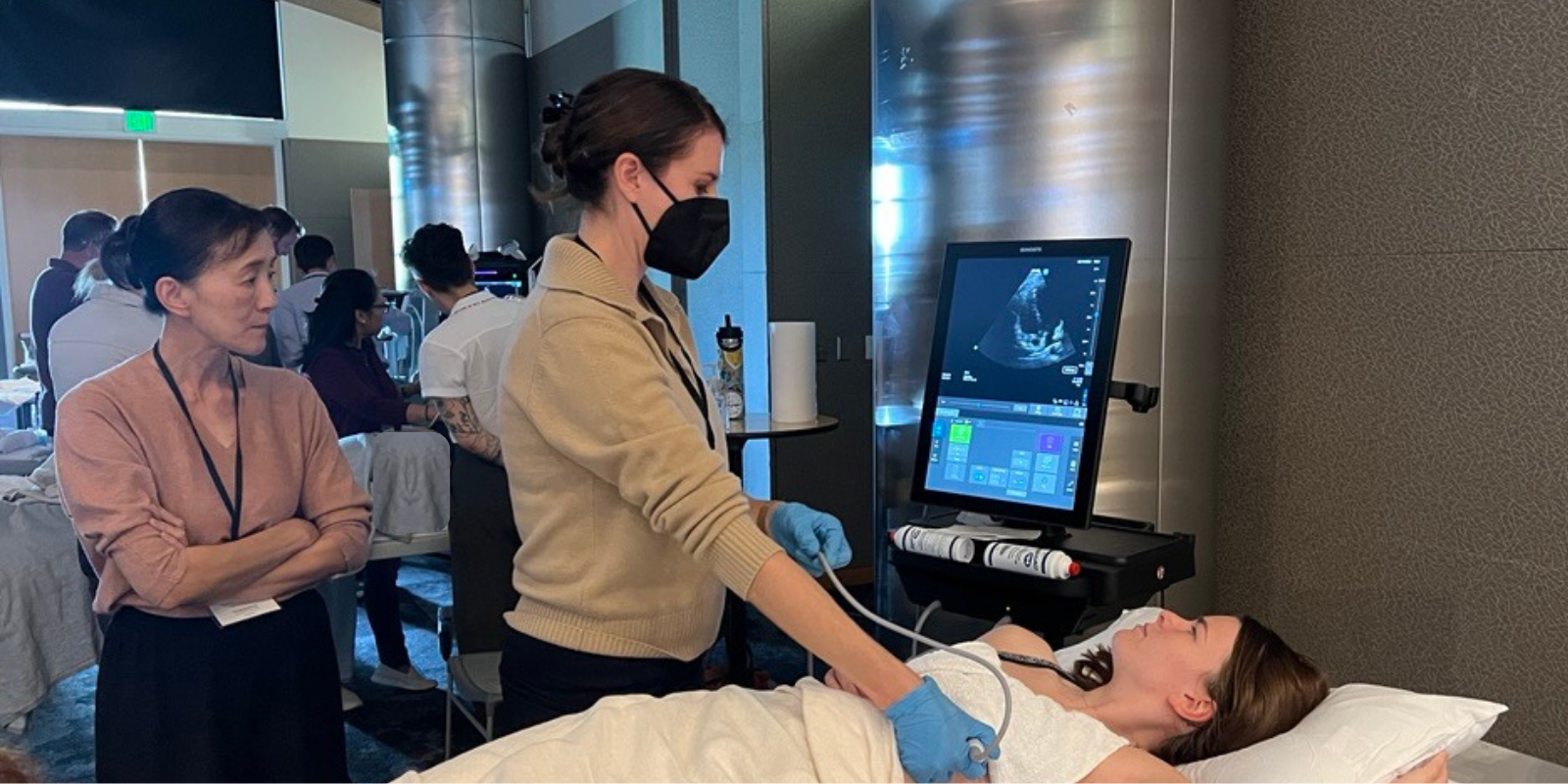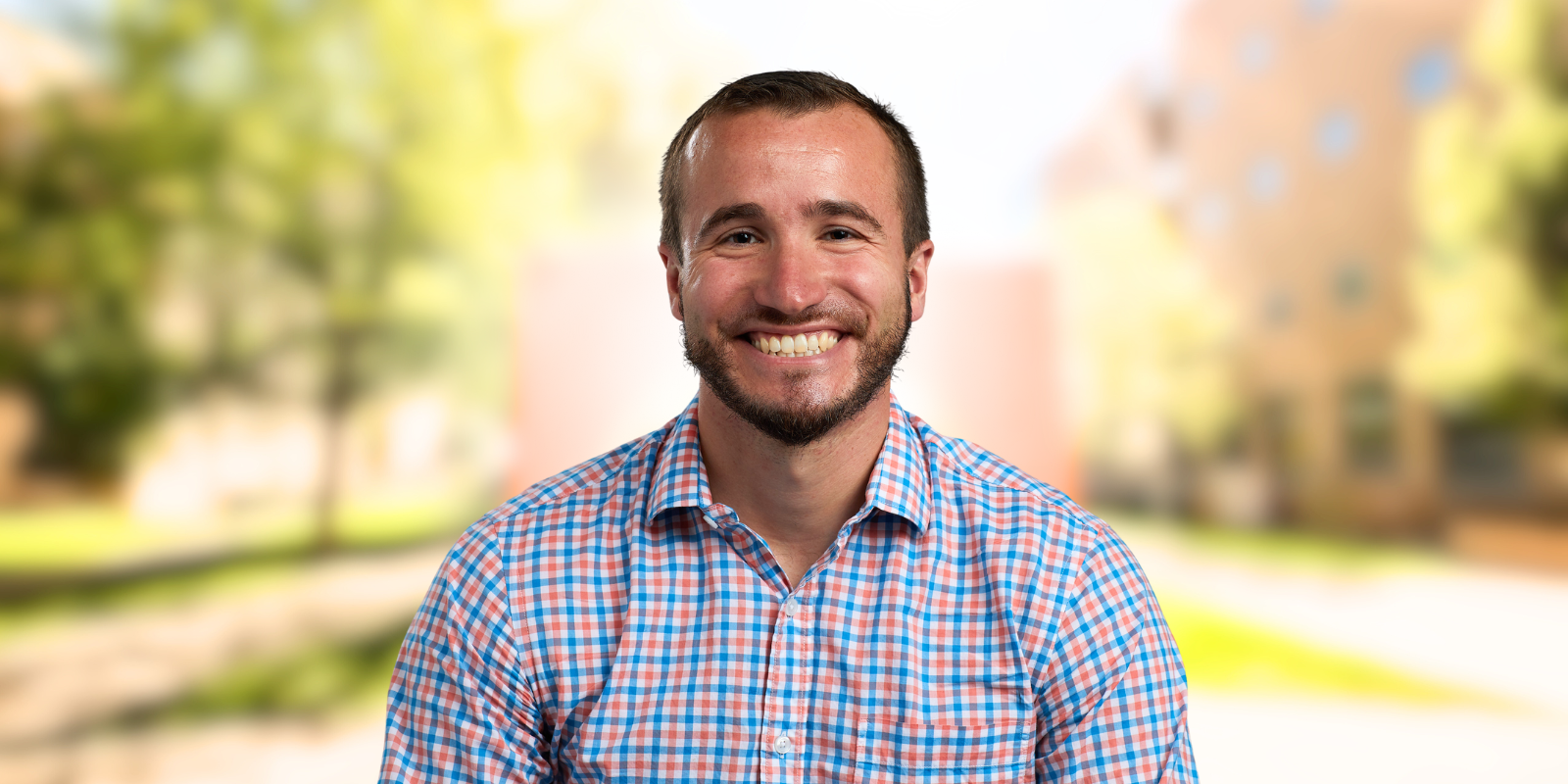Tears came to the eyes of primary care physician Michelle Nikels, MD, when Jacob Plaisted, a fourth-year medical student at the time, asked if she would be the person to place his doctoral hood over his head during the University of Colorado School of Medicine Hooding and Oath Ceremony, a momentous occasion that celebrates the graduating class of medical students as they officially become doctors. It was a full-circle moment for Nikels because she met Plaisted during his first year of medical school, and the pair had forged a powerful mentor-mentee relationship over the past four years.
“When students go through medical school, they meet hundreds of faculty members. To be the one person who they ask to hood them, it is such an honor,” says Nikels, an associate professor in the Division of General Internal Medicine in the CU Department of Medicine. “It was so exciting but also emotional. I’m so proud because I watched his growth from the beginning to the end of medical school.”
For Plaisted, now officially a doctor of medicine, there was no question in his mind about who he wanted to share his hooding moment with.
“Dr. Nikels was there from day one, teaching me the first steps on how to become a doctor,” says Plaisted, who will join an internal medicine residency program at the University of Washington this summer. “It was important to me that she was there for the last day, because she was the biggest influence on me in terms of how to care for people.”
The unique mentor-mentee partnership between Nikels and Plaisted would not have been possible if the CU School of Medicine did not adopt a new curriculum, called the Trek Curriculum, in 2021. Plaisted and his fellow students in the Class of 2025 were the first cohort to go through all four years of the new curriculum, which incorporates novel methods of training students. It was under this new model that Plaisted was first introduced to Nikels, who helped him hone his clinical and interpersonal skills so he could become a doctor who prioritizes listening and caring for patients with empathy.
“We wanted to forge these longitudinal relationships because we know that it’s better for students and their learning, and I also think it’s better for faculty as well,” Nikels says. “We now get to see these students at multiple points throughout their training, and that helps us get to know them better. The more of a trusting relationship you have with students, the better of an educator and mentor you can be.”
The power of listening
When Plaisted first stepped on the CU Anschutz Medical Campus to begin his training, he was buzzing with excitement and nerves. Having grown up on the east coast with dreams of becoming a doctor from an early age, Plaisted took a leap of faith when he joined the CU School of Medicine despite having never been to Colorado before.
One of the first faculty members he met was Nikels through the school’s Developing Our Clinical Skills (DOCS) course, a new feature under the Trek Curriculum, that focuses on teaching first-year medical students how to blend basic science knowledge with clinical reasoning, communication, and physical examination skills. Students are put into smaller groups and assigned a DOCS coach, who they meet with weekly throughout their first year of medical school.
Nikels, passionate about mentorship and helping others, jumped at the opportunity to become a DOCS coach. Knowing how important strong communication skills are in the medical field, she wanted to teach students how to form meaningful relationships with patients.
“How do we make patients feel heard and listened to? How do we create this environment where patients are willing to talk to us about things that are personal and hard, and how do we do that so patients feel comfortable and cared for? These communication skills are really important for primary care providers like me and for all physicians,” Nikels says.
When Plaisted first had to step up in front of his peers and practice his ability to conduct a physical exam and interview a standardized patient (meaning a person who is pretending to be a patient with a certain condition), it was nerve-racking, he recalls.
“Medical school often attracts a certain kind of person who can be very hard on themselves if they are not good at something, but Dr. Nikels did a great job of anticipating that and creating a safe, low-pressure learning environment where we could figure out the first steps on how to be a doctor,” Plaisted says. “With her help, I learned how to have a conversation with patients where important information will reveal itself naturally. Those listening skills were really important, and that was something that carried over into my second year during our clinical interactions together.”
 Jacob Plaisted, standing fourth from the right in the back row, smiles alongside other CU School of Medicine students. Image courtesy of Plaisted.
Jacob Plaisted, standing fourth from the right in the back row, smiles alongside other CU School of Medicine students. Image courtesy of Plaisted.
Putting skills into action
The CU School of Medicine was one of the first large medical institutions in the country to adopt a longitudinal integrated clerkship (LIC) training model for all its students. Under the LIC model, second-year medical students are assigned to one of the schools’ 16 LIC sites, where students are placed with a specific preceptor — meaning a practicing physician who provides training to the student — in each of their core specialties for an entire year.
Plaisted requested that Nikels be his LIC preceptor for his outpatient internal medicine rotation, working alongside her in a primary care outpatient clinic every week throughout his second year of medical school.
“She knew my strengths and weaknesses,” Plaisted says. “I thought it would be best to continue to work with someone who I already had an established rapport and relationship with.”
Because of their preexisting relationship, Nikels knew Plaisted was ready to start seeing patients from day one in the clinic. Over the months, he continued to develop his clinical expertise and forge meaningful relationships with patients. For instance, he helped one patient, an older male adult, figure out that he was taking an unnecessary medication that was causing negative symptoms — an example of the value of de-prescribing that Plaisted later shared with other health care providers during two medical conferences. But one key lesson came from a female patient who didn’t need any medical help, because she came to the clinic right after being discharged from the hospital.
“At first, Jake wondered what we could do for the patient, given that she was just in the hospital that morning and would not have any medical needs. I told him, ‘We’re just going to listen,’” Nikels says. “That’s all we ended up doing. We sat with the patient and listened for 30 minutes and heard about her feelings and concerns. We didn’t have to do anything else. After, Jake said he could see the value of what we did. Even though we didn’t draw any blood or make any medicine changes, he saw that we helped her.”
Recalling that interaction, Plaisted says: “Dr. Nikels really taught me to see patients as people first. She showed me how practicing medicine is not just about paying attention to what medical issues are present, but a much bigger part is caring for the person and expressing empathy. She constantly exemplified that in the clinic and seeing that was such an important part of my learning.”
 Jacob Plaisted, center, leading a “pre-clinic huddle” at DAWN Health, where he was a student director. Image courtesy of Plaisted.
Jacob Plaisted, center, leading a “pre-clinic huddle” at DAWN Health, where he was a student director. Image courtesy of Plaisted.
Continuing the mentorship cycle
Having always been interested in being a mentor himself, during his fourth year of medical school, Plaisted decided to take an elective course that focused on training physicians to be future educators. As part of that, he had the opportunity to join Nikels’ DOCS group again — this time, as a student facilitator who would help Nikels in training first-year students.
“I remembered how anxious I was when I was a first-year student, and when I became a facilitator and sat in that room with those students, I could see the same feelings on their faces,” Plaisted says. “When I would help teach and train the students, I tried to normalize what they felt and reassured them that they would improve sooner than they think.”
Plaisted also helped students develop their clinical skills through his involvement in Dedicated to Aurora’s Wellness and Needs (DAWN) Health, a free, student-run health center for uninsured patients.
“I tried to do for them what Dr. Nikels did for me during my clerkship,” he says. “It was enjoyable to have those roles flipped, and I found the experience to be very fulfilling.”
For Nikels, it was rewarding to see how Plaisted had grown as both a physician and mentor.
“Over these four years, he’s obviously grown in his clinical and scientific expertise, but I’ve also seen such emotional maturity,” she says. “He’s very driven, sharp, pragmatic, practical, thoughtful, and very personable. He is kind, non-judgmental, and he knows how to take his scientific knowledge and humanize it. He lets patients speak for themselves, and he’s able to connect with students to help them with their educational needs.”
Looking ahead, Plaisted is preparing to embark on his internal medicine residency training in Washington with the goal of later pursuing a pulmonary and critical care fellowship. He plans to also incorporate medical education into his future career.
As for Nikels, she will continue mentoring CU medical students — a practice that she says is mutually beneficial, as her mentorship work encourages her to continue reflecting on how she can improve in her work and be more compassionate to others.
“Mentoring gives me so much joy. I remember how vulnerable I felt as a medical student, and I’ve seen how the challenges of medical training can lead physicians to sometimes become closed off to patients. I want to let students know that you can maintain your humanity and be a good doctor, because that wasn’t ever taught to me,” Nikels says. “It took these teaching experiences to help me figure that out. I think being a mentor does as much for my professional development as it does for the students I’ve mentored.”
Photo at top: Jacob Plaisted, MD, and Michelle Nikels, MD, celebrate Plaisted's graduation from the CU School of Medicine.



